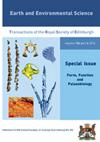宇宙联系:詹姆斯·克罗尔对同时代人及其继任者的影响
IF 1.2
4区 地球科学
Q4 GEOSCIENCES, MULTIDISCIPLINARY
Earth and Environmental Science Transactions of the Royal Society of Edinburgh
Pub Date : 2021-05-10
DOI:10.1017/S1755691021000098
引用次数: 2
摘要
本文考察了詹姆斯·克罗尔(1821-1890)的冰期天文学理论,其对同时代人约翰·廷德尔、查尔斯·莱尔和查尔斯·达尔文的影响,以及气候变化科学的后续发展,特别关注了斯凡特·阿伦尼乌斯、尼尔斯·埃克霍尔姆和g·s·卡伦达(二氧化碳理论)和米卢廷·米兰科维奇(天文理论)的工作。克罗尔的洞见是,轨道元素引发了反馈,导致了复杂的变化——季节性、洋流、冰盖、辐射强迫、植物和动物的生命,以及一般的气候——这使他的冰川期理论成为天文学、地球物理学和地质学的纽带。他认为气候变化是地球物理学中最重要的问题,也是最终证明其影响最深远的问题。他自学成才,深谙哲学,是后来被称为“宇宙物理学”(后来被称为“地球系统科学”)的早期支持者。克罗尔开辟了“气候争议”的新维度,这种争议一直持续到今天,即地质和人类对气候的影响相互作用。本文章由计算机程序翻译,如有差异,请以英文原文为准。
Cosmic connections: James Croll's influence on his contemporaries and his successors
This paper examines the astronomical theory of ice ages of James Croll (1821–1890), its influence on contemporaries John Tyndall, Charles Lyell, and Charles Darwin, and the subsequent development of climate change science, giving special attention to the work of Svante Arrhenius, Nils Ekholm, and G. S. Callendar (for the carbon dioxide theory), and Milutin Milanković (for the astronomical theory). Croll's insight that the orbital elements triggered feedbacks leading to complex changes – in seasonality, ocean currents, ice sheets, radiative forcing, plant and animal life, and climate in general – placed his theory of the Glacial Epoch at the nexus of astronomy, terrestrial physics, and geology. He referred to climate change as the most important problem in terrestrial physics, and the one which will ultimately prove the most far reaching in its consequences. He was an autodidact deeply involved in philosophy and an early proponent of what came to be called ‘cosmic physics’ – later known as ‘Earth-system science.’ Croll opened up new dimensions of the ‘climate controversy’ that continue today in the interplay of geological and human influences on climate.
求助全文
通过发布文献求助,成功后即可免费获取论文全文。
去求助
来源期刊
CiteScore
2.00
自引率
0.00%
发文量
21
期刊介绍:
Earth and Environmental Science Transactions (formerly Transactions of the Royal Society of Edinburgh: Earth Sciences) is a general earth sciences journal publishing a comprehensive selection of substantial peer-reviewed research papers, reviews and short communications of international standard across the broad spectrum of the Earth and its surface environments. The journal prides itself on the quality of its graphics and photographic reproduction. The Editors are keen to encourage interdisciplinary papers and Transactions also publishes occasional special symposia and invited volumes of specific interest.
We are currently in the process of digitising the archive of RSE Publications, and the archive of the Transactions, dating back to 1788, will be available from the back issues link on this site.

 求助内容:
求助内容: 应助结果提醒方式:
应助结果提醒方式:


